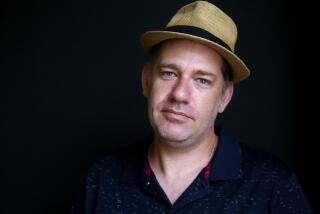How the Chubais Clan, Harvard Fed Corruption
- Share via
WASHINGTON — As more becomes known about Western participation in the laundering of Russian money, the Washington establishment will likely try to hide behind stories of faraway organized crime and distance itself from any culpability.
But U.S. policy toward Russia has contributed to that country’s sorry conditions. Russian “reformers,” including many under investigation for allegedly laundering billions of dollars through the Bank of New York, have long been embraced by the Clinton administration and international financial institutions. Among them are current and former members of Russian President Boris N. Yeltsin’s government, to which the West pinned its hopes for a new relationship with Moscow and entrusted hundreds of millions of dollars in aid. For years, despite accounts of massive capital flight, money laundering and Russians buying up the French Riviera, the money kept flowing. Yet, no Russian dollar can be deposited in a Western bank account without the knowledge and participation of a Western institution. As former Russian Prime Minister Viktor S. Chernomyrdin, who is accused of corruption, recently asked: “What has suddenly made them [the Americans] wake up?”
Among those under investigation in the West for money laundering is longtime Yeltsin aide Anatoly B. Chubais, the chief architect of Russia’s economic reforms. While under investigation in Russia for matters ranging from suspect banking deals to bribery, Chubais and his clique of political and financial power brokers, known as the “Chubais clan,” were the darlings of the U.S. Treasury and international financial institutions. With Treasury Secretary Lawrence H. Summers the key architect of U.S. economic policy toward Russia since 1993, the administration gave the Chubais clan much control over hundreds of million of dollars in aid.
The clan worked closely with the Harvard Institute for International Development, whose Russia project was headed by economist Andrei Shleifer, Summers’ coauthor and protege. Citing “foreign policy considerations,” Clinton administration policymakers largely bypassed the usual public bidding for foreign-aid contracts. Harvard principals with ties to the Chubais clan were given “substantial control of the U.S. assistance program,” according to a 1996 report by the U.S. General Accounting Office. Since 1997, Shleifer and another Harvard principal have been under investigation by the U.S. Justice Department for misuse of funds.
The Harvard Institute, together with the Chubais “dream team,” as Summers called it, presided over Russia’s economic “reforms,” many of them U.S.-funded, including privatization. But the reforms were more about wealth confiscation than wealth creation. The first stage of privatization, which had substantial input from U.S.-paid Harvard advisors, fostered the concentration of property in a few Russian hands and opened the door to widespread corruption.
Then Chubais approved the “loans-for-shares” program, which was masterminded by his associate, Vladimir O. Potanin, a onetime deputy prime minister for economic affairs who also is named in the current money-laundering investigations. It was under this scheme that insider deals and coziness between government and Russia’s oligarchs became crystallized for all to see. But the Clinton administration continued its support for its favored “reformers.”
In the name of privatization, loans for shares transferred control of many of Russia’s prime assets for token sums to seven preselected bank chiefs. Potanin, chairman of one of them, the powerful Unexim bank, since 1993, paid rock-bottom prices for shares in some of the nation’s crown jewels. He also enabled the Harvard Management Company, the university’s endowment fund, to participate in loans-for-shares auctions and get in on two of Unexim’s best deals, despite the fact that foreign investors were supposed to be excluded under auction rules.
Another “reformer” was Konstantin Kagalovsky, an old friend of the Chubais clan and husband of Natasha Kagalovsky, who was suspended by the Bank of New York in the money-laundering scandal. In charge of incoming foreign aid in 1991, Kagalovsky was sent to Washington to be Russia’s first liaison to the International Monetary Fund. After serving in the post from 1992 to 1995, he returned to Russia in time to participate in the loans-for-shares scam. As deputy head of Menatep bank, Kagalovsky presided over the “auction” of Yukos, a large oil company. As it turned out, Menatep acquired the company in the auction, a deal that the Chubais group clearly had approved.
Besides failing to achieve viable economic reform, the Chubais-Harvard partnership undermined democratic and state institutions. With U.S. support, it operated through executive decree, circumventing the Duma, the democratically elected parliament. The partnership also ran a network of aid-funded “private” organizations, some of which usurped state functions. For example, the Russian Privatization Center negotiated loans with the IMF on behalf of the Russian state, bypassed the Duma and contributed to the Chubais clan’s political and financial base. It attracted some $4 billion in Western aid, according to its CEO, which the Chamber of Accounts, Russia’s rough equivalent of the GAO, said “was not spent as designated.”
In 1996, the GAO also had objections. It found that U.S. oversight over Harvard was “lax,” and, following allegations in 1997 that Shleifer and another Harvard manager used their positions and inside knowledge as advisors to profit from investments in Russia, the U.S. government canceled the last $14-million award earmarked for Harvard.
Did the Russians do all this alone? Clearly, the administration consistently backed a small group of self-interested insiders by giving them the “dream team” seal of approval and a blank check in the form of billions of dollars in Western aid and loans, while neglecting to encourage the development of a legal and regulatory backbone for Russia’s nascent market economy. In 1996, Chubais was placed on Harvard’s (U.S.-assistance-funded) payroll. Even his admission, after the Russian economic crash last August, that he had “conned” from the IMF its most recent $4.8-billion installment, the details of the deal having been worked out with Summers, brought administration officials to Chubais’ defense. As we now know, the IMF money disappeared in short order.
Still, Chubais has remained an administration favorite son. In Washington last May, Chubais, now chairman of Russia’s electricity monopoly, was received by U.S officials, including Summers, then-Treasury Secretary Robert E. Rubin, Secretary of State Madeleine K. Albright, Undersecretary of State Strobe Talbott and National Security Advisor Samuel R. Berger, as well as by top officials of the IMF and World Bank. Were these officials and politicians oblivious to the “clan-state” developing in Russia, in which property was concentrating in a very small circle and owners were chosen by government officials? Were they totally unaware that billions of dollars were being looted from Russia and channeled through Western banks?
As information trickles out about capital flight and money laundering, it will be easy to point fingers at “corrupt” Russians, to replace the image of the “evil empire” with that of Russian gangsters. It will be crucial to scrutinize with equal fervor the officials and institutions on the Western side that enabled, indeed may have even encouraged, the misdeeds.*
More to Read
Sign up for Essential California
The most important California stories and recommendations in your inbox every morning.
You may occasionally receive promotional content from the Los Angeles Times.










